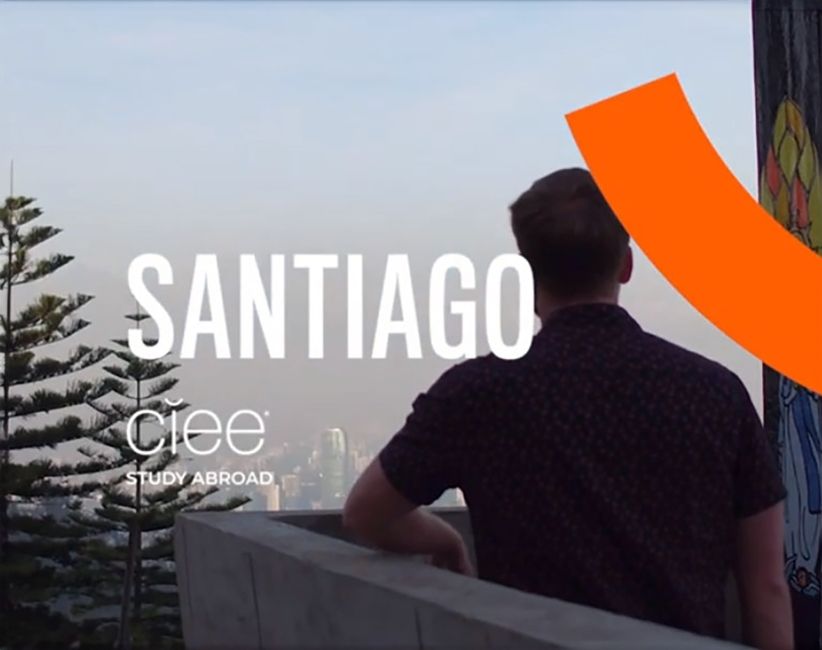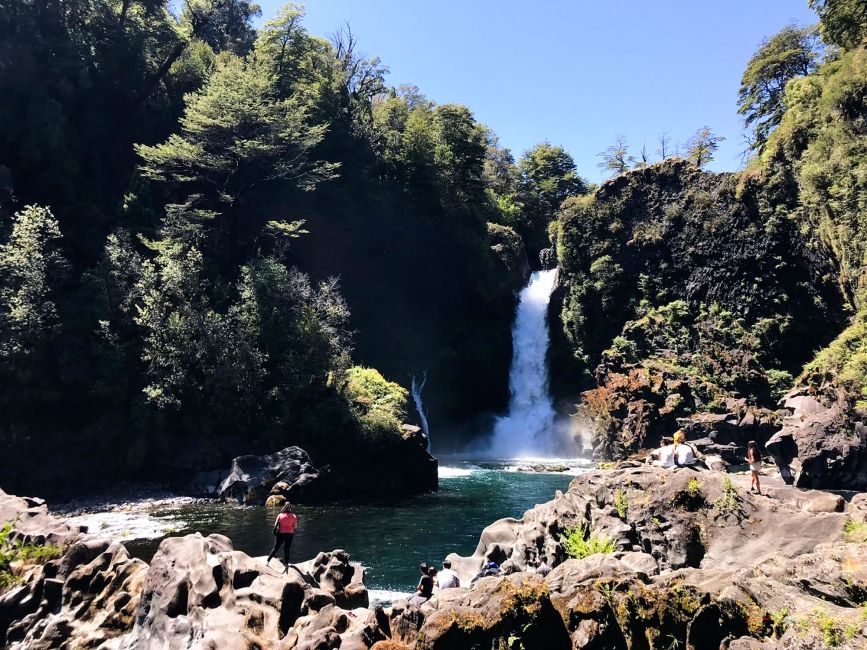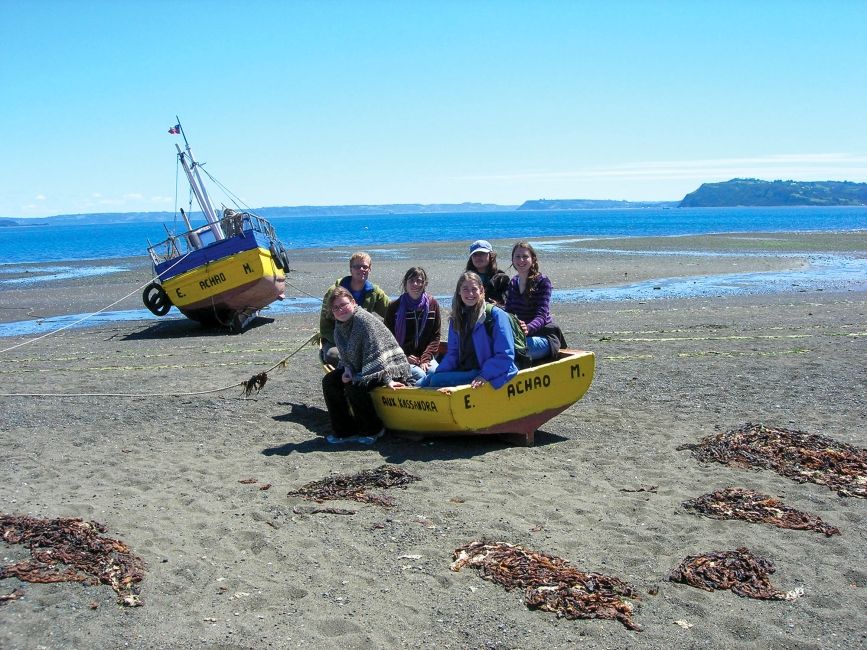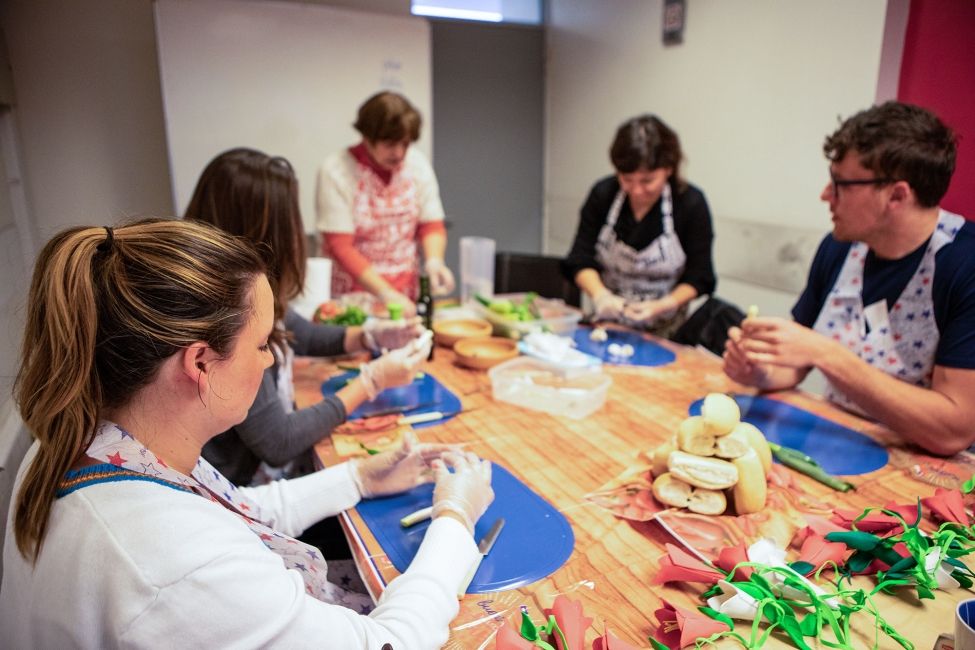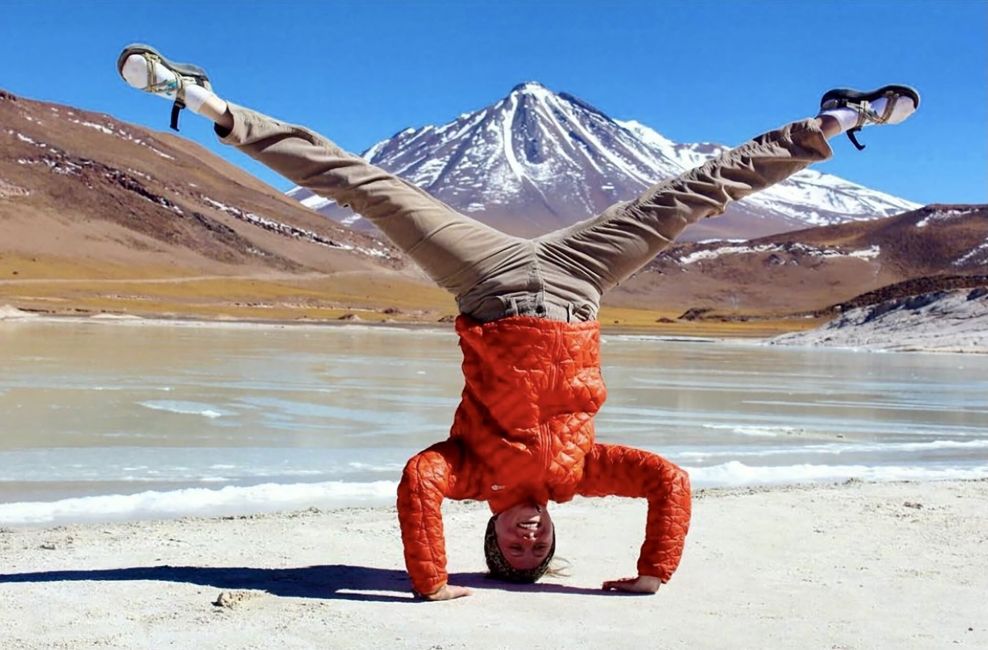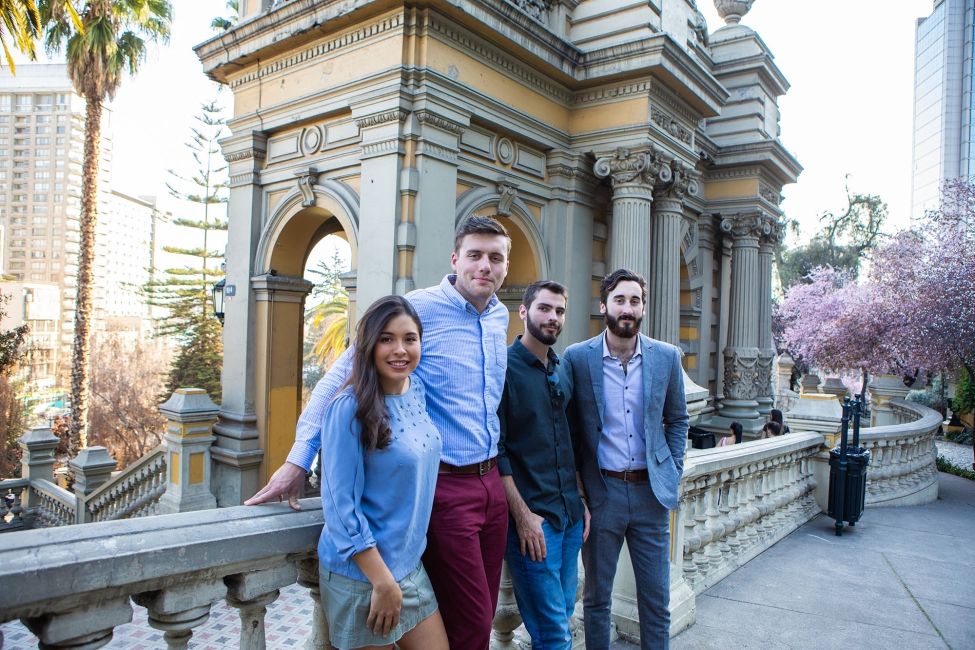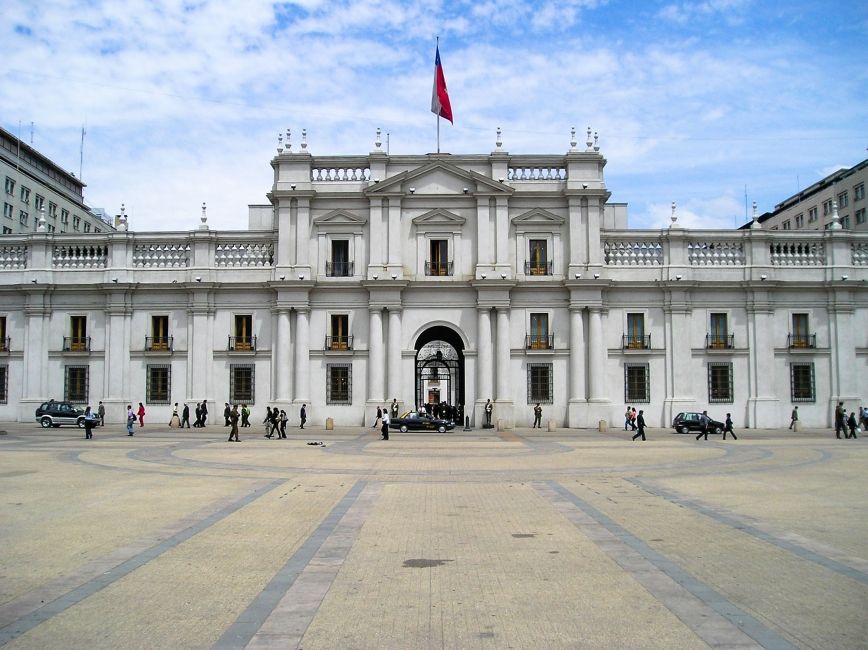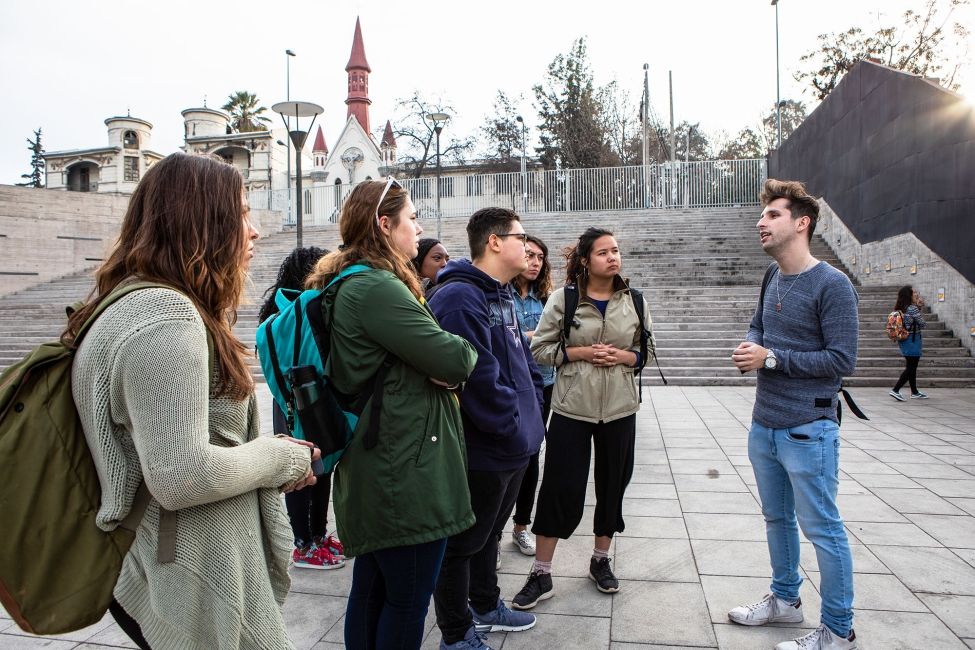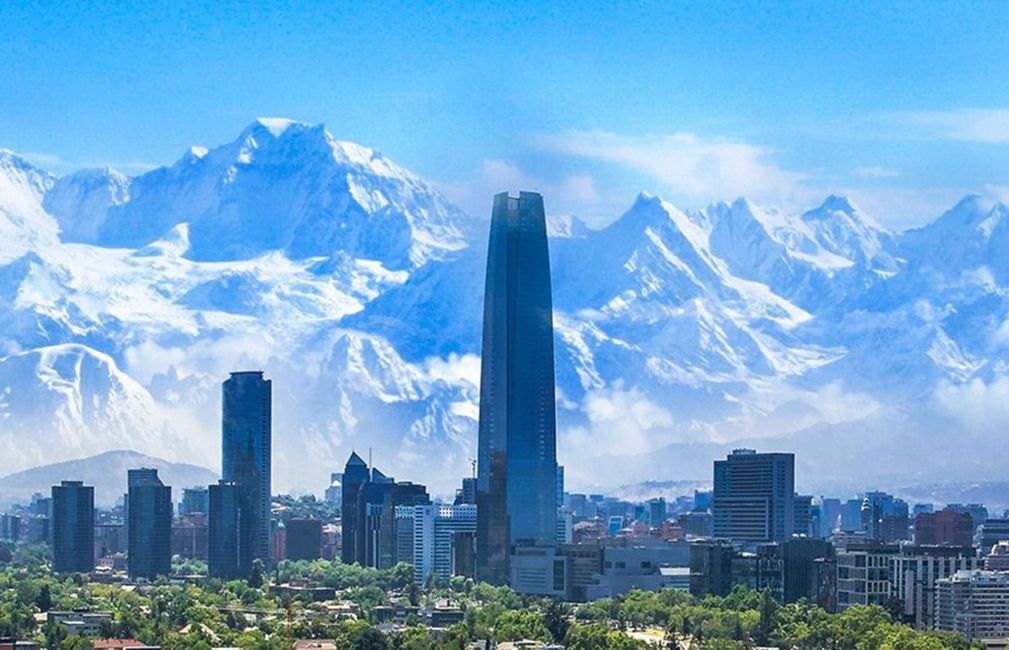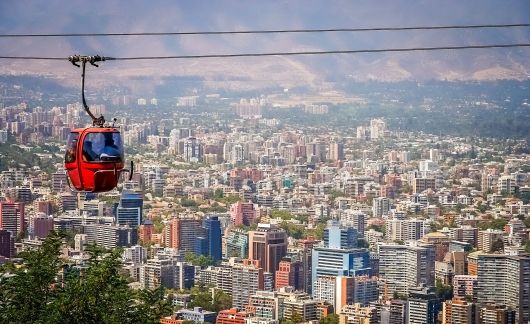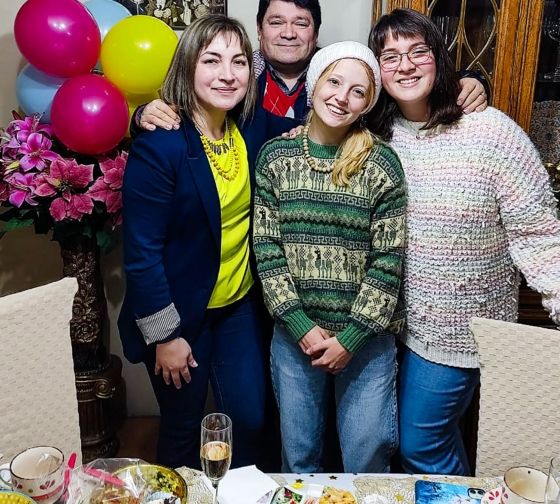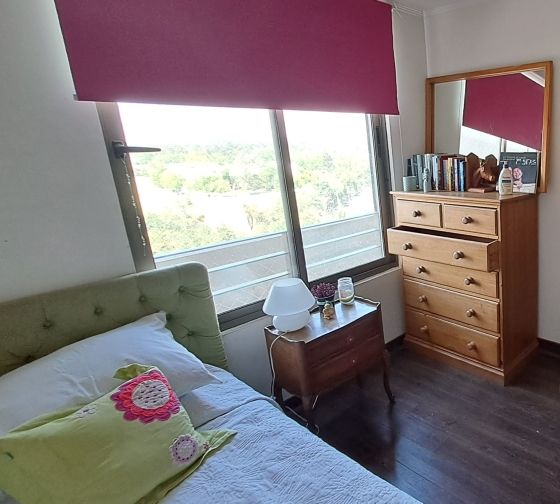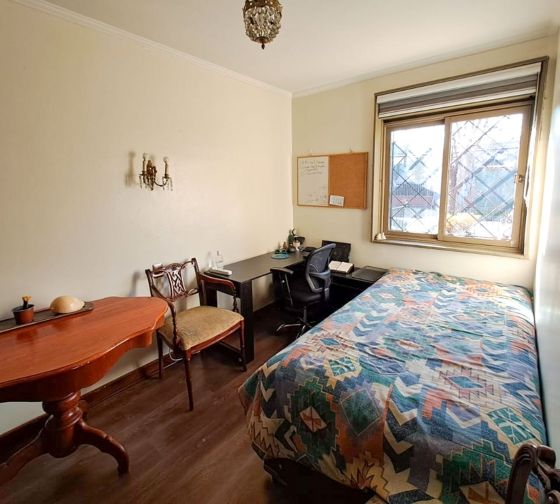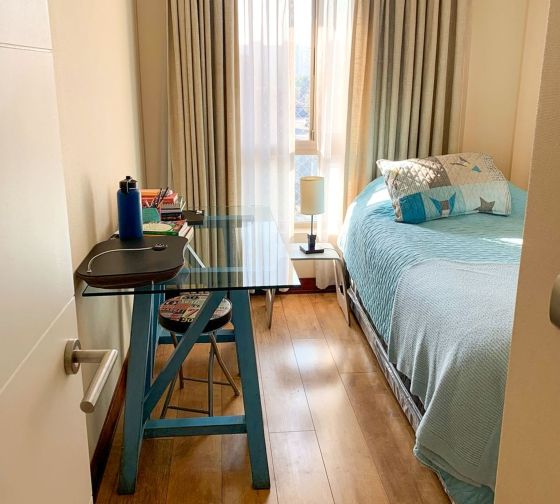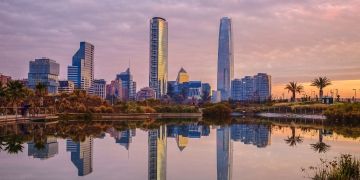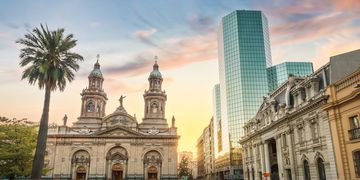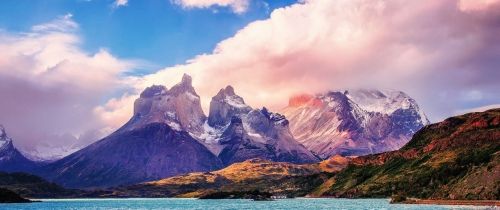
Liberal Arts
AACSB and EQUIS ✓
Unique Experiences
Explore Santiago’s neighborhoods with insider tips
with CIEE-organized activities with cultural ambassadors
Taste Chilean street food
like completos (hot dogs), sopaipillas (quick bread), arepas (flatbreads), and tequeños (cheese sticks)
Meet students from all over Chile
while taking courses with locals in our three partner universities
Your Destination
Santiago is Chile’s vibrant capital, where Spanish language immersion and rich cultural experiences go hand in hand. Whether you're practicing Spanish with locals in lively markets, chatting at a neighborhood café, or exploring historic barrios like Bellavista and Lastarria, every moment deepens your connection to the language and culture. With a dynamic mix of tradition, modern energy, and creative spirit, Santiago is the perfect place to study abroad.
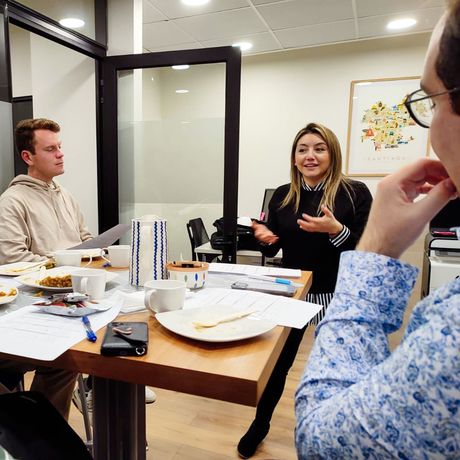
Program Highlights
- Academic Courses: Choose from CIEE courses and host institution courses that align with your academic major.
- Optional Internship Placements: Enhance your program with an optional for-credit internship that aligns with your career aspirations.
- Immersive Experiences: Participate in activites, excursions, study tours, and more that showcase your host city's culture, values, and local art, film, music, cuisine, and sports scenes.
- Cultural Projects: Volunteer with members of the local community, join student clubs to socialize with your peers, and attend local workshops and events to get to know your host city.
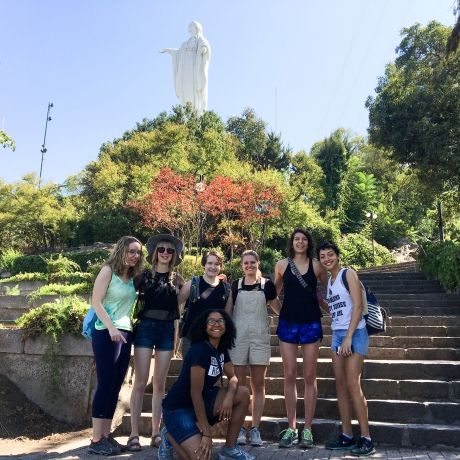
Excursions & Activities
CIEE’s excursions and cultural activities in Santiago will open doors for you to explore Chile's rich diversity, language, culture, history, and timeless beauty in ways that will enhance your time abroad.
Samples of past excursions and activities:
- Visit the charming towns of Isla Negra and Algarrobo, where you can explore Pablo Neruda’s seaside home
- Discover the breathtaking landscapes of Cajón del Maipo or La Campana National Park, perfect for hiking or wildlife spotting
- Dive into Chilean history with excursions to destinations like Chiloé Island, the Atacama Desert, or Araucanía
Please note: Activities are based on past programs and subject to change at CIEE's discretion to adapt to local circumstances and participant feedback. Our goal when arranging activities is always to enhance your experience.
Program Blogs
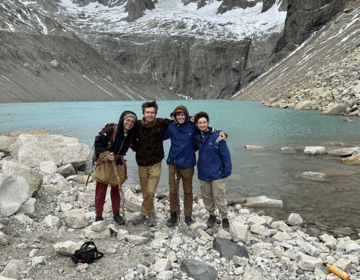
Princess Peluda
One of the first things I noticed about my house in Chile was that it was much like the country itself: long, narrow, and full of opportunities to make mistakes... keep reading
Mountains of Santiago
When you first arrive in Santiago, the first thing that strikes you is the mountains. Right in front of you, behind you, to the side—they rise up every which way... keep reading

Celebrating "El 18", Chile´s Independence day
September is a very important month in Chile, not only do we welcome spring during this month in the southern hemisphere, but we also celebrate the independence of Chile on... keep reading
Housing & Meals
Housing
CIEE Santiago offers diverse housing options to ensure you're comfortable in your home away from home. From homestays to residence halls, we will strive for your accommodation preferences to be met. Homestays are ideal for students who wish to experience living with local families in apartments or houses. CIEE Santiago also offers non-homestay accommodations in residence halls for students who want to live with other Chilean and international students.
Standard Housing:
- Homestays: Includes a private room (single or double placement with another CIEE student) in the residence of a host family. Homestays feature weekly laundry, Wi-Fi, and two meals per day. Homestays are nearby subway stations and public transportation, coffee shops, convenience stores, and ATMs are available in metro stations, restaurants, and other amenities.
- Residence Halls: Includes a triple or double room in a residence hall, located within 30 minutes from the city center. Students can prepare their meals in the facility and access study areas and other amenities. This type of accommodation offers fully furnished kitchen space, laundry facilities shared with other students, shared bathrooms, and WiFi. Meals are not included.
Select Housing: Includes a single room in a residence hall. Residence halls are located five minutes (on foot) from a subway station that connects with the rest of Santiago (30-minute commute to city center). Students can prepare their meals in the facility and access study areas and other amenities. This type of accommodation offers fully furnished kitchen space, laundry facilities shared with other students, shared bathrooms, and Wi-fi. Meals are not included.
A note: The default criterion to assign housing is first-come, first-served; however, other factors may also be considered. If we cannot accommodate your first housing choice, we'll let you know before you arrive. Non-standard housing options require an additional fee that can be found in the program Dates and Fees.
Meals
- Residence Hall (Standard housing non-homestay and Select housing): Meals are not included. Students can prepare their own meals in the fully furnished kitchen, which includes utensils and cleaning supplies. Students can also explore the myriad restaurants in the areas surrounding the residence hall.
- Homestay: Students who live with homestay families receive two meals daily to be agreed upon with the host family (breakfast, lunch, or dinner). The third meal and/or any snacks are on the student. Students can make use of the kitchen space at the homestay and families will provide a cabinet or storage area to store their food, ingredients, etc.
Academics
CIEE Santiago: Study on the main campus of University Diego Portales (UDP), CIEE’s partner institution, surrounded by the beauty of Cerro San Cristóbal Hill. CIEE Santiago boasts a student-friendly campus with spacious classrooms, a comfortable lounge, quiet study areas, and common spaces for coursework and socializing with fellow students.
Universidad de Chile Universidad de Chile (UChile): Founded in 1842, Universidad de Chile is the country’s oldest and one of its most prestigious public universities. Known for its commitment to academic excellence, social responsibility, and public service, UChile plays a central role in Chile’s intellectual and cultural life. With a strong emphasis on research and innovation, it offers a broad range of programs across diverse disciplines. Its urban campuses in Santiago foster dynamic engagement with the city’s political, cultural, and social landscape, making it an ideal setting for students seeking a deeply immersive academic experience in Latin America.
Pontificia Universidad Católica de Chile (PUC): Pontificia Universidad Católica de Chile (PUC) is one of the oldest and most prestigious universities in the country. Founded in 1888, it is a private institution of higher education with strong ties to the Catholic Church, although its academic focus is secular and pluralistic. PUC has become a leading university in Latin America and is characterized by its educational quality, its high research standards and its contribution to the cultural, social, and scientific development of Chile and the region.
Universidad Diego Portales (UDP): Universidad Diego Portales (UDP) is a private university founded in 1982. Despite being a relatively young institution compared to other universities in the country, it has managed to stand out for its academic approach, its educational quality and its commitment to the social and cultural development of Chile.
Course Information
Academic Projects
Communication, Journalism, and Media
Languages and Cultural Studies
Academic Projects
Communication, Journalism, and Media
Languages and Cultural Studies
Academic Projects
Communication, Journalism, and Media
Languages and Cultural Studies
All course selections are made in consultation with the CIEE Study Site Director and a designated staff person from each Chilean university. The reality of the academic system in Chile is such that course listings and availability are not determined until immediately prior to the start of university classes in a given semester. The final list of courses is available and sent to students a month before the program starts in Santiago de Chile. Students take courses at host institutions with local students in most of their classes The following list is a representative sampling of courses available at the sponsoring universities. Students may enroll in any course for which they meet the prerequisites. In addition to the courses listed below, the host institutions offer a wide range of courses in many disciplines, including:
- Agricultural Science
- Agronomy
- Anthropology
- Archaeology
- Architecture
- Arts
- Biology
- Business Administration
- Chemistry
- Cinema
- Communications
- Computer Science
- Cultural Studies
- Dance
- Development Studies
- Economics
- Education
- Engineering
- English
- Environmental Studies
- Fine Arts
- Foreign Languages
- Geography
- Health and Medicine
- History
- Humanities
- International Relations
- Latin American Studies
- Law
- Linguistics
- Literature
- Management Science
- Mathematics
- Music
- Natural Sciences
- Philosophy
- Physics
- Physical Science
- Political Science
- Psychology
- Public Health
- Public Policy
- Religious Studies
- Social Studies
- Sociology
- Spanish Language
- Theater
- Urban Studies
- Zoology
Pontificia Universidad Católica de Chile Courses
Art
Advanced Engraving, Art in Chile, Basic Drawing, Latin American Painting, Metal Engraving, Watercolor
Geography
Cartography, Chilean Geography I and II, Cultural Geography, Environmental Geography, Introduction to Geography, Political Geography, Rural Development, Urban Planning
History
American National I and II, Ancient History, Chile 1964–2000, Contemporary History, Discovery and Conquest, Economic History, Europe in the 19th Century, Hispanic Chile, National Chile I and II, Pre-Columbian Cultures
International Relations and Political Science
Chilean Foreign Policy, Chilean Political Parties, Contemporary International Politics, Elements of Political Science, Fundamentals of Political Theory, Re-Democratization Processes in Latin America, Representation and Electoral Systems
Journalism and Communications
Contemporary History, Economic Journalism, Investigations, Journalistic Photography, Television Journalism, Visual Communication
Linguistics and Literature
Aesthetics of Neruda’s Poetry, Ancient Literature, Chilean and Hispano-American Narratives, Chilean and Hispano-American Poetry, Chilean and Hispano-American Theater, Contemporary Chilean Theater, General Medieval and Classical Literature, Hispano-American Literary Texts, Introduction to Linguistics of Text, Modern and Contemporary Literature, Nobel Prizes of Latin American Literature, Representation of Women in the Works of Maria Luisa Bombal, Marcela Serrano, and Manuel Puig, Spanish Classical Literature, Spanish Writing Workshop
Philosophy
Kant, Logic, Ethics, and Contemporary Philosophical Texts; Medieval Philosophy; Metaphysics; Philosophy of Science; San Agustín’s Selected Writings
Psychology
Community Psychology, Culture and Society in Latin America, Human Relations, Introduction to the Psychology of Jung, Principles of Learning in Adults, Psychology of the Chilean Adolescent
Sociology
Art and Religion, Biblical Initiation, Fundamental Principles of Christian Morality, History of the Ancient Church, History of the Church in Chile, Religious Psychology, Religious Sociology, Religious Studies, Synoptic Gospels and Apostolic Missions, The Person of Christ
Universidad de Chile Courses
Anthropology and Archaeology
Andean Culture, Anthropology of Development, Anthropology of Gender, Anthropology of Poverty, The Cultural Formation of Latin America, Folklore as Culture, Gender and Society, Judaism: Religion and Culture, Latin American Thought, Mapuche Culture, Rapa Nui Culture, Rural Anthropology, Sociological Theory and Structure in Chile, Urban Anthropology, Women in Latin American Society, Introduction to Anthropology
Art
Art History, Drawing, History and Analysis of Music of the 20th Century, Introduction to Art, Photography, Pottery
Business and Management
International Business, Management, Finance, Accounting, Latin American Business Challenges
Geography
Geography of Chile -16th to 19th Centuries, Physical Geography-Climatology and Meteorology, Political Geography, Regional Geography of America, Social and Administrative Geography
History
Ancient History: Roman Empire, Chilean Political Parties, Chilean-Peruvian Relations, History of America: 17th Century, History of America: USA 1860–1920, History of Chile: 18th and 19th Centuries, Indigenous America, Introduction to History, Modern History: 17th and 18th Centuries, Pre-Hispanic History of America and of Chile, Revolutions and Social Movements in the 20th Century, Introduction to Chilean History
International Relations and Political Science
Chilean Public Administration, Contemporary International Conflicts, Government and Public Administration, Latin American Politics, Negotiation and Conflict Management, Political Ethics, Political Parties: Theory and Practice, U.S.- Latin American Relations, Introduction to Political Sciences, Introduction to Political Ideologies
Journalism
Comparative National and International Press, Contemporary History and Geography, Contemporary Latin American Art and Literature, Film: Cinematographic Analysis, International Relations, Latin American Communication and Thought
Law
Chilean Institutional History: 16th-18th Century, Indigenous Legislation in Chile, International Public Law
Linguistics and Literature
Contemporary Chilean Literature, Contemporary European Literature, Contemporary Hispanic American Literature, Contemporary Hispanic American Novel, Contemporary Spanish Literature, Don Quixote, Ethnic and Psycholinguistics, Hispanic American Narrative of the 1980s, History of the Spanish Language, Literary Theory, Medieval Literature, Medieval Women Writers, Modern Hispanic American Literature, Modern Spanish Literature
Philosophy
Contemporary Philosophy, Esthetics, Ethics, Introduction to Philosophy, Logic, Medieval Philosophy, Metaphysics, Philosophical Anthropology, Philosophy, Philosophy of Science, Political Philosophy, Theory of Knowledge
Sociology
History of Social Thought, Human Rights, Introduction to Marxist Thought, Organizational Sociology, Political Sociology, Social History of Chile, Social History of Latin America, Social Theory in Latin America, Sociology, Introduction to Sociology
Universidad Diego Portales Courses
History
American History I, American History II, American History III, Historical Writing, History of Chile I, History of Chile II, History of Chile III, Pre-Columbian Cultures, Research Seminar: America I, Research Seminar: America II, Research Seminar: Chile I, Research Seminar: Chile II, Sociocultural Anthropology.
Political Science
Chile and the International System, Contemporary Political Theory, International Relations in Latin America, International System and Institutions, Modern Political Theory, Political and Economic Development of Chile, Political and Economic Development in Latin America.
Sociology
Family, Gender, and Society, Political Sociology, Social Anthropology, Social Processes I: Americas, Social Processes II: Chile, Social Psychology, Sociology of Consumption, Sociology of the Media, Urban Sociology.
Journalism, Communications and Film Making
Contemporary History, Economic Journalism, Investigations, Journalistic Photography, Television Journalism, Visual Communication, Advertising, Creative Writing, Film making, Audiovisual Language, Script writing.
General Electives
These courses are mostly second year courses with study themes which vary from feminism to indigenous groups in Chile, Social Movements, Patriarchy, Latin American music and culture, etc. This is a long list of courses that students can select from and are taught by local staff in Spanish.
Note: This course listing is for informational purposes only and does not constitute a contract between CIEE and any applicant, student, institution, or other party. The courses, as described, may be subject to change as a result of ongoing curricular revisions, assignment of lecturers and teaching staff, and program development. Courses may be canceled due to insufficient enrollment.
"(GI)" denotes courses that originated at CIEE's Global Institutes and that are offered at multiple CIEE sites.
Scholarships & Grants
CIEE offers scholarships and grants annually to help students like you make your study abroad dream a reality.
Students who apply to this program are eligible for the following scholarships and grants:
- Wollitzer Merit Scholarships in Area or Comparative Studies
- Ping Scholarships for Academic Excellence
- Global Access Initiative (GAIN) Grants
- CIEE Gilman Go Global Grant
To be considered, submit the CIEE Scholarships & Grants application within your CIEE program application.
Dates & Fees
You get more for every dollar when you study abroad with CIEE, because our high-quality programs include everything from excursions to insurance. There are no hidden charges, and no disappointing surprises when you arrive.
Program |
Application Due |
Start Date |
End Date |
Fees & Housing |
|---|---|---|---|---|
| Program Spring 2026 19 weeks | Application Due Deadline Passed | Start Date | End Date | Fees & Housing $14,950 |
| Program Fall 2026 19 weeks | Start Date * | End Date * | Fees & Housing $14,950 | |
| Program Academic year 2026-2027 50 weeks | Start Date * | End Date * | ||
| Program Calendar year 2026 | Application Due Deadline Passed | Start Date * | End Date TBD* | |
| Program Spring 2027 19 weeks | Start Date * | End Date * |
*Dates for this program are provided as tentative dates. Please consult with your study abroad advisor to confirm dates before purchasing your flights.
To help you budget, keep in mind that students are responsible for the cost of international airfare, local transportation, books and supplies, visas, and personal expenses. In addition, your college or university may charge additional fees for study abroad, or may require you to receive a transcript via CIEE's School of Record, which carries an additional fee of $500.
Program Fees
CIEE offers the most student support of any provider in its program fee, including an airport greeting, full-time leadership and support, orientation, cultural activities, local excursions, pre-departure advising, and CIEE iNext travel protection with benefits.
| Participation Confirmation | $300 * |
| Educational Costs | $10,706 ** |
| Housing | $3,750 *** |
| Insurance | $194 |
| Total Fees | $14,950 |
Optional Housing
CIEE accommodation options are detailed in the Housing section. Based on availability, Select or Select Plus Housing can be chosen during the application process for an additional fee. Housing is assigned on a first-come, first-served basis; however, other factors may also be considered.
| Select Housing Fee | $950 |
Financial Aid
CIEE offers the most grants and scholarships of any study abroad organization, including $8 million/year in travel grants, merit-based scholarships, institutional grants, and Gilman Go Global Grants.
Estimated Costs
Students are responsible and manage costs related to travel, meals, books, and personal expenses. Below are estimates for consideration.
| Meals not included in program fee | $1,197 † |
| International Airfare | $1,100 †† |
| Local Transportation | $200 ††† |
| Books & Supplies | $20 |
| Visa Fees | $160 †††† |
| Personal expenses | $245 ††††† |
| Total Costs | $2,922 |
*non-refundable fee
**direct cost of education charged uniformly to all students
***Housing fees listed are for financial aid purposes only and should not be considered a basis for calculation of refunds.
†For students in homestays, families provide 2 meals (breakfast and dinner). For students in apartments, you should budget approx. $280 per month for groceries if you plan on making your own meals, and more if you plan on eating out regularly.
††round-trip based on U.S. East Coast departure
†††considering 1 round trip in subway daily for the 7 days of the week during all of the program duration
††††average cost
†††††$100 emergency fund + cell phone expense + toiletries
Program Fees
CIEE offers the most student support of any provider in its program fee, including an airport greeting, full-time leadership and support, orientation, cultural activities, local excursions, pre-departure advising, and CIEE iNext travel protection with benefits.
| Participation Confirmation | $300 * |
| Educational Costs | $10,706 ** |
| Housing | $3,750 *** |
| Insurance | $194 |
| Total Fees | $14,950 |
Financial Aid
CIEE offers the most grants and scholarships of any study abroad organization, including $8 million/year in travel grants, merit-based scholarships, institutional grants, and Gilman Go Global Grants.
Estimated Costs
Students are responsible and manage costs related to travel, meals, books, and personal expenses. Below are estimates for consideration.
| Meals not included in program fee | $1,197 † |
| International Airfare | $1,100 †† |
| Local Transportation | $200 ††† |
| Books & Supplies | $20 |
| Visa Fees | $160 †††† |
| Personal expenses | $245 ††††† |
| Total Costs | $2,922 |
*non-refundable fee
**Direct cost of education charged uniformly to all students
***Housing fees listed are for financial aid purposes only and should not be considered a basis for calculation of refunds.
†For students in homestays, families provide 2 meals (breakfast and dinner). For students in apartments, you should budget approx. $280 per month for groceries if you plan on making your own meals, and more if you plan on eating out regularly.
††round-trip based on U.S. East Coast departure
†††considering 1 round trip in subway daily for the 7 days of the week during all of the program duration
††††average cost
†††††$100 emergency fund + cell phone expense + toiletries
Program Fees
CIEE offers the most student support of any provider in its program fee, including an airport greeting, full-time leadership and support, orientation, cultural activities, local excursions, pre-departure advising, and CIEE iNext travel protection with benefits.
Financial Aid
CIEE offers the most grants and scholarships of any study abroad organization, including $8 million/year in travel grants, merit-based scholarships, institutional grants, and Gilman Go Global Grants.
Estimated Costs
Students are responsible and manage costs related to travel, meals, books, and personal expenses. Below are estimates for consideration.
Program Fees
CIEE offers the most student support of any provider in its program fee, including an airport greeting, full-time leadership and support, orientation, cultural activities, local excursions, pre-departure advising, and CIEE iNext travel protection with benefits.
Financial Aid
CIEE offers the most grants and scholarships of any study abroad organization, including $8 million/year in travel grants, merit-based scholarships, institutional grants, and Gilman Go Global Grants.
Estimated Costs
Students are responsible and manage costs related to travel, meals, books, and personal expenses. Below are estimates for consideration.
Program Fees
CIEE offers the most student support of any provider in its program fee, including an airport greeting, full-time leadership and support, orientation, cultural activities, local excursions, pre-departure advising, and CIEE iNext travel protection with benefits.
Financial Aid
CIEE offers the most grants and scholarships of any study abroad organization, including $8 million/year in travel grants, merit-based scholarships, institutional grants, and Gilman Go Global Grants.
Estimated Costs
Students are responsible and manage costs related to travel, meals, books, and personal expenses. Below are estimates for consideration.
What's Included
Tuition
Housing
Pre-departure Advising
Advising before you depart to set goals and answer questions
Optional on-site airport meet-and-greet
Orientation
Introduction to your program plus practical information about living in your host city
On-site Staff
Full-time program leadership and support in your city
Cultural and/or Co-curricular Activities
Excursions and/or Study Tours
Travel Protection
CIEE iNext travel protection
24/7 emergency on-site support
Meals
Our Staff
Victor Muñoz
Center Director
Víctor is passionate about studies. He graduated with a degree in business and economy, has a master's degree in strategic management and project evaluation, and certifications of data science in...
Camila Soto
Program Coordinator
Camila Soto has a bachelor's degree in literature with experience in independent publishing, language teaching, and international education. At CIEE she has worked at the Teach in Chile program and...
Get Started
1
2
Connect With Your Campus Study Abroad Office
Share your plans and confirm you're on track to meet all required steps to go abroad.
3
Contact Us
Send us an email if you still have questions or need information about applying to this program.
